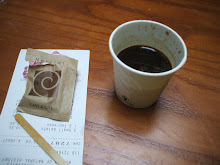I have often approached cooking with the same sort of blind gusto I used for many other pursuits. I'd take an idea or a recipe and execute it to the best of my ability. Often, the results were good. Sometimes, the results were not good. While I rarely produced anything that was truly bad, I also rarely produced anything that was truly great. More often, I would come up with some thing that was good—or good enough. Often what I lacked in knowledge, I made up for in exuberance. What I lacked was a true understanding of how the process of cooking worked. Call it a blind spot for scientific interest or perhaps a disinterest in process.
What really changed things was getting a 22 inch Weber grill this summer. It's one of the big kettle grills that can be used to do anything from making pizza to smoking meat. It's simple in its design and requires nothing other than charcoal for cooking. I tend to use hardwood charcoal rather than briquets since it produces a better, hotter fire. Be all that as it may, I've learned how big a jump it is from grilling a steak well to understanding how to grill tofu, vegetables, or chicken. Smoking ribs was also an education unto itself. The reality is that different kinds of fires work in different ways, and different foods require different approaches because of how they will react to the fire. It's part intuition, part science, and it is all about understanding and being patient with the process. Or rather, it is if you want to cook well, consistently.
Earlier this week, for instance, I smoked ribs in the Weber. To do so, I could have put a fire down and slapped the ribs over it and covered the grill, but the result wouldn't have been nearly as good. Instead, I delved into the best ways and used a hot, indirect fire, and a drip pan with water and cider vinegar. I prepped a mop sauce based on how the components actually interacted with the kind of heat I was using—for instance, a dash of sugar to give sweetness, but not enough to caramelize on the meat. In fact, it's small details like understanding how ingredients interact and react that I've begun to watch. The result? Truly excellent ribs. Could I do them again better next time? Probably.
In the end, cooking is like so many things in life: you have to understand—deeply—what you're doing and why you're doing it before you can take the step from pretty good and happy accidents to excellent and consistent.
skip to main |
skip to sidebar

I'm back. Have a blast, y'all.

About Me
Blog Archive
- June (1)
- July (1)
- May (5)
- January (3)
- December (1)
- November (2)
- September (4)
- August (11)
- July (7)
- June (1)
- May (2)
- April (2)
- March (5)
- February (4)
- January (4)
- November (3)
- October (3)
- September (3)
- August (1)
- July (3)
- April (2)
- March (5)
- February (3)
- January (7)
- December (8)
- November (12)
- October (5)
- September (8)
- August (6)
- July (5)
- June (14)
- May (13)
- April (24)
- March (21)
- February (22)
- January (22)
- December (20)
- November (26)
- October (24)
- September (35)
- August (27)
- July (36)
- June (21)
- May (26)
- April (28)
- March (27)
- February (20)
- January (38)
- December (26)
- November (11)
- October (32)
- September (33)
- August (30)
- July (36)
- June (34)
- May (50)
- April (36)
- March (3)
- January (3)
- December (3)
- November (3)
- August (6)
- July (4)
What I Like
- A List Apart
- Accidental Creative
- AdLand
- AdRants
- Atrios
- Batocchio
- Byrd House Market
- Chowhound
- Creating Passionate Users
- daddytypes.com
- Daily Kos
- Design Observer
- design*sponge
- Epicuriousity (John Haddad)
- Flickr shots
- Gawker
- Getting Real - 37 Signals
- Gothamist
- Incertus
- Phil's bookmarks (web design and more)
- river city food and wine
- Smeltery fonts
- TreeHugger
- Veer
- Vitaly Friedman's fonts
- Wonkette
- Wornamental, Thornamental Design
- Xtcian
- zefrank
